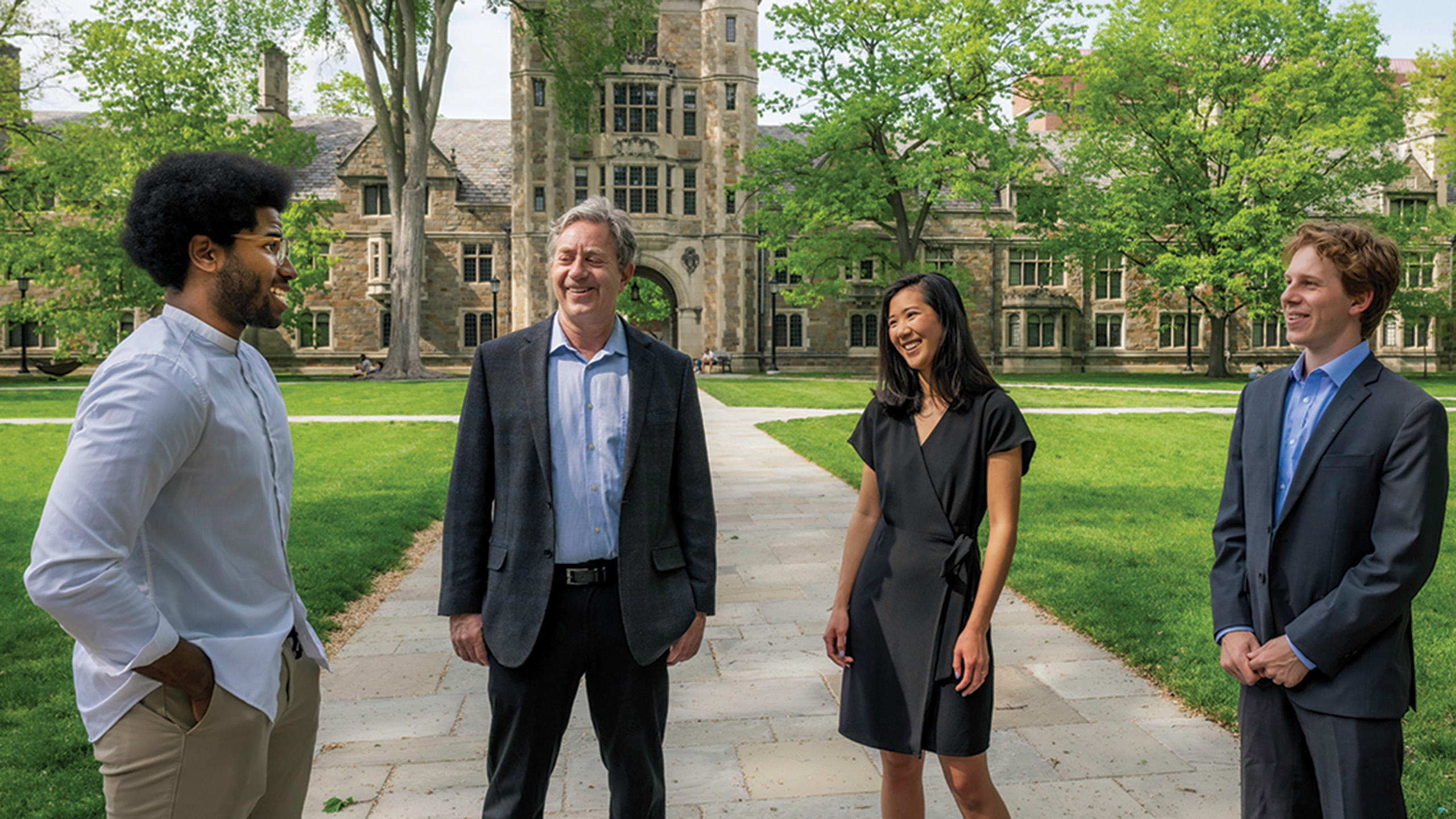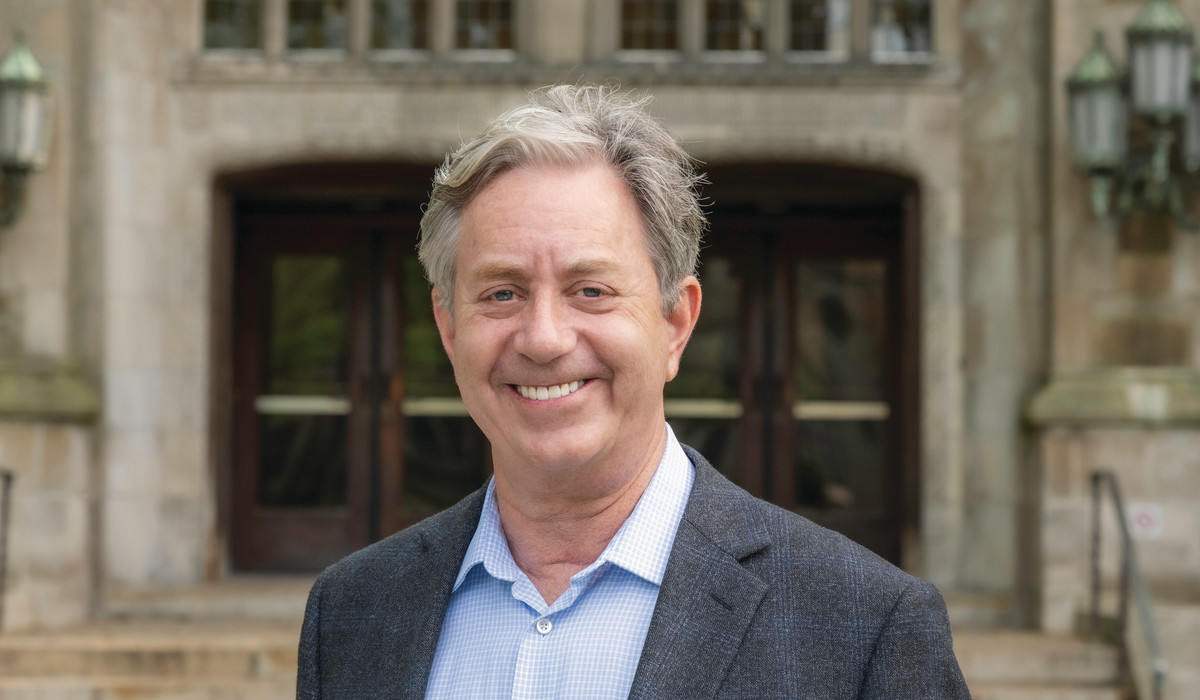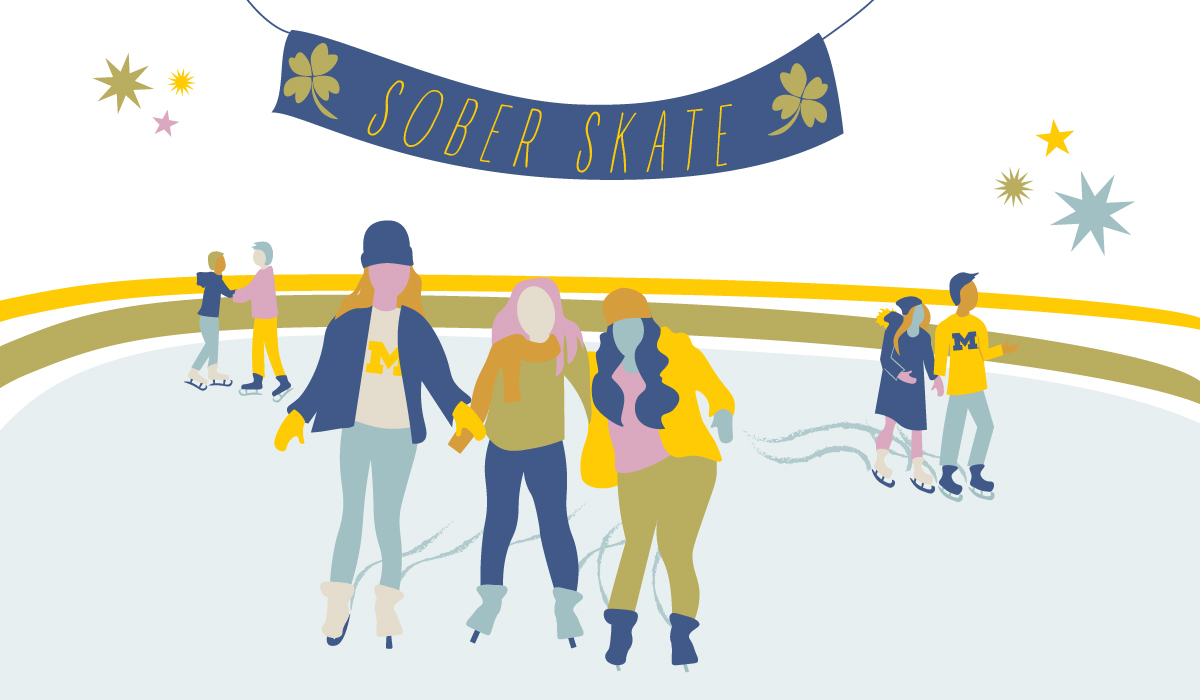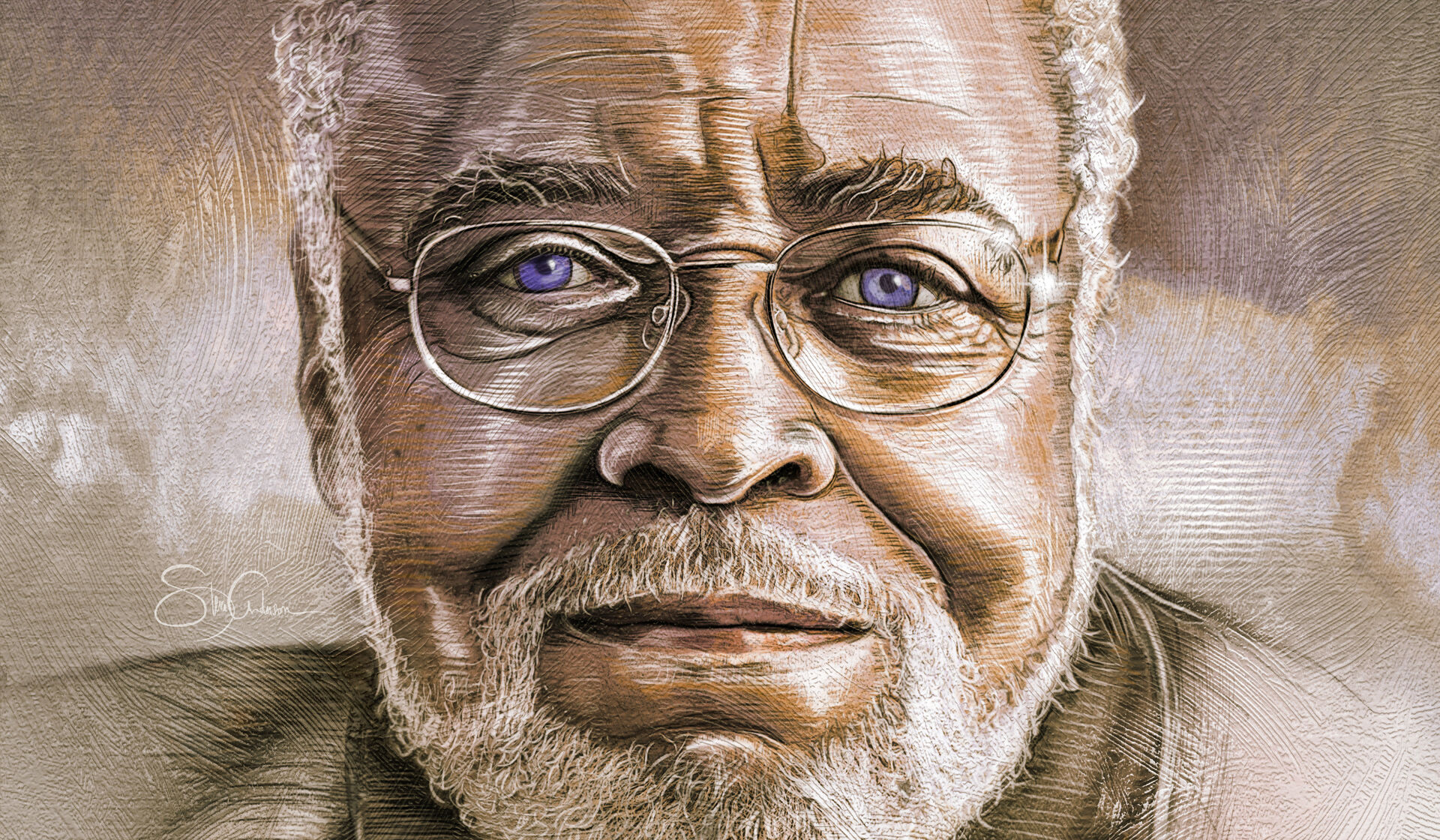Trial By Fire
•
Photos by Doug Coombe
In the national media coverage surrounding the April 13 filing of a landmark federal lawsuit against Detroit police for using facial recognition software to wrongfully jail a Black man on robbery charges, the roles of Deborah Won and Jeremy Shur were largely a footnote.
News of the case credited the American Civil Liberties Union and the U-M Law School’s Civil Rights Litigation Initiative (CRLI). But few reports noted that the 75-page brief arguing that the arrest of Robert Julian-Borchak Williams was unconstitutional, asking for unspecified damages, and demanding the Detroit police stop using the technology was written entirely by the two U-M law students.
“I hadn’t ever even filed a complaint or litigated a case before,” Won says. “This is definitely a major highlight of my law school career.”
Won and Shur are two of a select group of students chosen by Professor Michael J. Steinberg for the CRLI, which he launched during the winter 2020 term. Since that time, about two dozen law students have provided pro bono counsel for a wide range of civil rights matters. In all cases, the students take the lead in working with clients, writing legal briefs, and making arguments in court.
“My philosophy on teaching is that students learn best by doing,” he says. “The clients look to me for advice, rather than looking to the students. So I try to put the students up there as much as I can for arguing cases, for client communications, for dealing with opposing counsel, for dealing with the press.”

The CRLI is Steinberg’s brainchild, an academic second act for a 60-year-old legal eagle who came to U-M Law after serving 22 years as the legal director of the ACLU of Michigan. “I decided I wanted to dedicate the rest of my career to training the next generation of civil rights and civil liberties lawyers,” he says. “I thought there’d be no better place to do that than at Michigan.”
Steinberg taught a civil rights law class at U-M for five years while still at the ACLU. He noticed that U-M had clinics that put students to work on real-world cases involving wrongful convictions, human trafficking, worker rights, and environmental justice, among others. The school administration gave him an enthusiastic green light to start the new program, which quickly became a hot ticket at U-M Law.
At any given time, as many as eight student lawyers staff the clinic; all must first take Steinberg’s civil rights seminar. He admits only 16 students to the seminar each year out of roughly 1,000 enrolled at the Law School; all are in their second or third year.
“The types of cases that the clinic is taking are unique and, I don’t think, something that I would have thought as a law student I would even be able to work on,” says Diane Kee, who was among the first students in the program. “I talked about my clinical experience throughout all of the interviews that I did for post-graduate jobs, so it had a huge impact.”
Kee, who will work this fall at the Washington, D.C., offices of powerhouse law firm Cohen Milstein, argued before a Michigan state judge in January — her first time speaking in court — on behalf of Mya King. The teenager was cited for impeding traffic during a Black Lives Matter (BLM) protest in Chelsea, Michigan, during the summer of 2020. The judge threw out citations for King and several other defendants, who were represented by other attorneys, after agreeing with the CRLI’s argument that the impeding traffic law itself was unconstitutional because it makes exceptions for people impeding traffic to collect charitable donations. That amounted to the state discriminating against people based on their message, Kee says.
“I was definitely really nervous about it, but I had done a lot of practice rounds with Mike and some of these other attorneys,” she says. “To the extent that clinical work through the University is so well supported, and that students are really empowered to be at the front of these cases, it was really exciting.”
I try to put the students up there as much as I can for arguing cases, for client communications, for dealing with opposing counsel, for dealing with the press.
— MICHAEL J. STEINBERG
Kee is the rare clinic participant who managed to see her cases through to the end. Through the CRLI, she also represented an Ann Arbor woman who was denied the opportunity to rent an apartment because she had two children. The CRLI filed a case in federal court, bringing a familial status discrimination case under the Fair Housing Act. The case was settled out of court last fall. In most CRLI cases, though, because litigation takes far longer than a given semester or year of law school, the students working under Steinberg must pass off their cases to successors.
Another clinic participant, Solomon Furious Worlds, is typical. He and his CRLI partner Elise Coletta took the lead on a complaint to the Michigan Department of Civil Rights against Ann Arbor Public Schools and Pioneer High School in August 2020 that alleged the high school is a racially hostile environment. That environment formed as a result of racially insensitive and hostile remarks by a faculty member about Black students and inaction from the school district’s administration. Further investigation by Worlds and Coletta revealed that the complaint may expand to include Asian and Hispanic students with complaints about treatment at the school, and it will continue even though Worlds has graduated.
“That’s one of the downfalls of the clinical model writ large,” says Worlds, who now works at the Michigan Immigrant Rights Center in Ypsilanti, Michigan. “Civil rights cases are notoriously long. It means you’ve got to move on. It’s unfortunate. You start to get attached to the clients.”
Won agrees: “I am a bit bummed about not being here for some of the action. I’ll be following the case closely just because I’m passionate about it, but I am sad to not be on the case team, officially, after I graduate.”
Steinberg says the clients are warned “up front that I’ll be there the whole time, but that they may have several students working throughout the course of the case.” They don’t seem to mind; King — the Chelsea teenager — told Steinberg that her experience with Kee has convinced her to become a public interest lawyer herself. “She’s like her hero,” he says.
Worlds says he did worry that the clients might feel like they’re getting the “B team” in terms of legal representation, but they’ve been appreciative and patient. “I did a good job at the beginning saying ‘Hey, I’m new.’ And, also, they know that I have a supervising attorney, so at any point if I do have questions, it’s a trapeze with the net underneath,” he says. “Even if my performance is flawed, I’m not going to fall and, ergo, my clients won’t fall to their doom.”

Steinberg says the clinic has been involved in about 20 cases since its inception, a figure he says is “probably too many” due to the small number of students at any given time. Other cases in progress include a free speech lawsuit from a high school teacher told to remove a BLM sign from her classroom backdrop when she was teaching remotely during the COVID-19 pandemic; against a Michigan’s women’s prison for overcrowding and unkempt living conditions; and against the city of Detroit alleging mistreatment and brutality in the police response to BLM protests during the summer of 2020.
In addition, Steinberg says, some student attorneys assist with an ongoing program called Justice InDeed, an effort he launched with community leaders to educate about, and eventually repeal, decades-old racially restrictive covenants that are still part of the deeds of thousands of Ann Arbor homes, although they are unenforceable.
“We’re kind of at capacity right now, so we’ll have to resolve some of the current cases before we take much more on,” he says. “But it’s hard to say no when there’s so much injustice, and because our name is getting out there, we’re getting more and more requests for help.”
To the extent that clinical work through the University is so well supported, and that students are really empowered to be at the front of these cases, it was really exciting.
— DIANE KEE
Many CRLI cases draw media attention, which Steinberg says is a key element of civil rights litigation because winning in the court of public opinion is important. That side of the process surprises and fascinates Won, who says she hadn’t really considered the extent of press strategy involved in the facial recognition case.
“Because it’s a case of national importance, we just really want to make sure that we’re setting the right tone,” says Won, who will spend her first years out of law school in judicial clerkships. “You’re dotting your i’s and crossing your t’s and making sure that both Michigan ACLU and ACLU national are signing off on everything as well. So there’s just multiple rounds of editing and making sure that we have our press strategy in place, things that I never really thought about being needed for a lawsuit. I’m really getting to learn through those teams, which is really cool.”
The practical experience is also helping sharpen some career goals. Worlds, for instance, says the taste he’s had of collaboration with the ACLU will motivate his career plan ahead. “Usually, it’s maybe a decade into a career before folks can apply and get a job” at the ACLU, he says. “Working with the clinic gives us the chance to test that out and see if that’s something we’d want to do. In my case, the answer is ‘yes.’”
Steve Friess is a Michigan-based freelance journalist and a 2011-12 Knight-Wallace Fellow at U-M.



